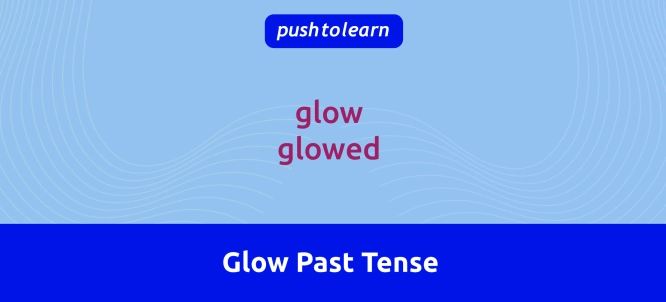by PushtoLearn
Glow Past Tense
Table of Contents
Glow Past Forms - Exercises
These exercises test different forms of the verb GLOW and IRREGULAR VERBS
Meaning
The verb "glow" means to emit a steady light, often without flames, or to radiate warmth, health, or emotion.
Example:
-
"The candle glows softly in the dark."
-
"She glows with happiness when she sees her friends."
When referring to past actions, "glow" changes to "glowed."

Forms of "Glow"
|
Tense |
Form |
Example Sentence |
|
Present |
glow |
"The fireflies glow in the summer night." |
|
Past |
glowed |
"Last night, the lantern glowed brightly in the garden." |
|
Past Participle |
glowed |
"The stars have glowed for centuries in the sky." |
|
Present Participle |
glowing |
"Her face is glowing with excitement." |
Examples of "Glow" in Sentences
Past Tense (glowed):
-
"The embers glowed faintly as the fire died down."
-
"Her cheeks glowed with warmth after coming in from the cold."
-
"The neon sign glowed brightly in the distance."
Past Participle (glowed):
-
"The sunset had glowed with vivid colours before fading into twilight."
-
"His eyes have glowed with excitement during every performance."
-
"The light bulb had glowed dimly before it burned out."
Common Mistakes with "Glow"
1. Using "glown" instead of "glowed":
Learners sometimes mistakenly use "glown" as the past tense or past participle of "glow," but this is incorrect. The correct form is always "glowed."
-
Incorrect: "The fireflies glown in the dark."
-
Correct: "The fireflies glowed in the dark."
-
Incorrect: "The lamp has glown brightly all night."
-
Correct: "The lamp has glowed brightly all night."
2. Confusing "glow" with "shine":
While "glow" and "shine" both describe emitting light, they are used differently.
-
Glow implies a steady, soft light, often from within.
-
Correct: "The coals glowed in the fire pit."
-
Shine suggests a brighter or more direct light source.
-
Correct: "The sun shone brightly in the clear sky."
3. Misusing "glowing" for static states:
The present participle "glowing" describes something currently emitting light or radiating energy. Using it for a static or unchanging state is incorrect.
-
Incorrect: "The moon was glowing and stayed glowing all night."
-
Correct: "The moon glowed and stayed bright all night."
Learn how irregular verbs are used in the Past Simple tense with this lesson and practice more. Check out other Grammar Exercises A1 for even more quizzes. Examples include Bite, Lie, and See.
FAQ
What is the past tense of "glow"?
The past tense of "glow" is "glowed."
How do I use "glowed" in a sentence?
Use "glowed" to describe something that emitted light or radiance in the past.
Example: "The candles glowed softly in the dark room."
What is the past participle of "glow"?
The past participle of "glow" is also "glowed."
Example: "The lanterns have glowed along this street for years."
Is "glown" a correct form?
No, "glown" is not correct. Always use "glowed" as the past tense and past participle.
Can "glow" be used figuratively?
Yes! Example: "Her face glowed with joy," meaning her expression radiated happiness.

